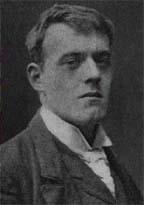
Historian Hilaire Belloc changed notions of Reformation Europe. “Throughout his life, Belloc tried to generate debate and to convince people to rethink their views on the past.”
A lot of today’s pop singers and actors seek quick celebrity through unconventionality, and call upon their fans to challenge the bounds of socially accepted thought. Much of this, probably most of this, is meaningless show, meant for shock effect and easy fame.
Thankfully, most of this behavior is limited to the entertainment industry. One rarely hears of academics acting in such a manner, especially in early 20th century England.
Yet the historical profession has produced its share of mavericks, and one of the most talented of these was Hilaire Belloc.
Belloc is regrettably under-read today, but in the last couple of years a number of his books have come back into print. Belloc was highly involved in the English intellectual scene of his time, successfully entering politics, interacting with other great minds, and smashing the golden calves of his day that defiled the historical community.
In an era of political correctness, the thought of a time when history textbooks unabashedly proclaimed national superiority due to race and religion seems antiquated at best, shocking at worst.
Yet that was the thesis of the Whig version of European history, the standard lecture plan for English students until the early 20th century.
Highly oversimplified, the Whig thesis was that England had risen to a position of dominance in world affairs partially due to the fact that the nation was both Anglo-Saxon and Protestant.
Belloc, a religious outsider in England, challenged this view.
Belloc wrote about numerous topics pertaining to European history, but so far the only two read by me are Why the Reformation Happened and Characters of the Reformation. Both are highly charged with intellectual fervor and are eminently readable.
In these works, Belloc critiques the motives behind the Reformation, as well as the people who played a prominent role in the drama.
Interestingly, Belloc spends a great deal of time pointing out how frequently the Reformation was nearly curtailed. The bulk of his work, though, is devoted to critiquing and refuting much of the Whig version of history.
Belloc is reasonably fair in his assessments, at least in my opinion. Even though his sympathies are obviously with those who strived for a united Christendom in Europe, he doesn’t turn the religious wars into a simple battle of good guys versus bad guys.
Belloc frequently illuminates Church abuses, although he is swift to debunk many of the fraudulent charges leveled against the Catholic Church.
However, Belloc denies the traditional belief that the Reformation was based solely on the corruption of the Catholic Church, pointing out there were other, equally important factors. Prominent among these were a special, personal hatred of the faith, jealousy of Church spiritual and financial authority, the insatiable desire of many princes to attain absolute power, and the chance for noblemen to become enormously rich through the theft of Church property.
Indeed, the Reformation caused serious disruptions in European society, most of which have been glossed over, even by today’s historians.
The Church provided financial support to the peasantry, but once the English nobles seized Church lands, these charities were withdrawn. Thousands of
Englishmen went from relative comfort and independence to become penniless slaves of the aristocracy in an amazingly short time. The aristocrats wallowed in obscene amounts of lucre, and the poor lost almost everything.
Women suffered horribly with the dissolution of the convents. These were the only chance for women to explore intellectual and artistic pursuits. Without the convents, thousands of women were forced into marriages or worse, sexual exploitation.
Belloc also took pains to critique traditional assessments of historical characters. Belloc argues that Henry VIII was really a weak-willed and spoiled monarch who broke with Rome primarily by bending to the ambitions of his advisors and his mistress. Queen Elizabeth I’s regime, asserts Belloc, was primarily driven by the wills of prominent noblemen.
Belloc also painted portraits of Luther, Calvin, and many others that were far less flattering than standard fare.
Needless to say, Belloc was immensely controversial. Unfortunately, most readers of Belloc today are philosophically inclined to agree with him.
While it may seem weird that I am disapproving of Belloc reaching a near-wholly appreciative audience, I have my reasons. Throughout his life, Belloc tried to generate debate and to convince people to rethink their views on the past. Now, Belloc is pretty much just preaching to the converted.
We need more opportunities in today’s classrooms to compare Belloc’s interpretations of the Reformation to more traditional views. I look forward to viewing and analyzing the resulting historiographic clash.
